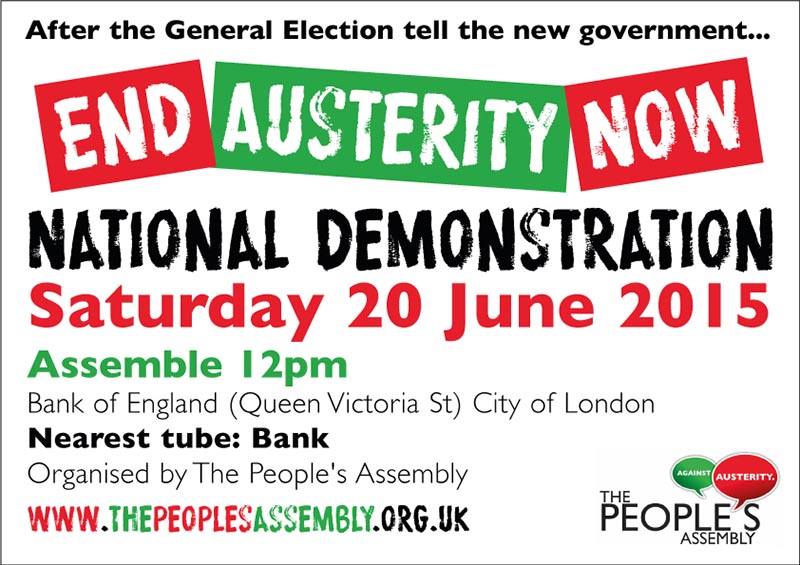Owen Jones – the socialist journalist and political commentator – has argued that “Britain’s battered, bruised and demoralised left” has much to learn from Podemos, the popular radical left party in Spain. Adam Booth asks: on what basis will a mass Left be built in Britain? And what is the way out for workers and youth from this endless crisis of capitalism?
On the morning of Wednesday 27th May, the Queen – on behalf of the Tories and the rest of the rotten ruling establishment – announced the measures that this government of the rich would be implementing in the period ahead; the latest in a long line of attacks against workers, youth, and unemployed.
Later that same day, thousands of militant and radical young people demonstrated through the streets of Westminster and Whitehall, shouting revolutionary slogans against the political elite that inhabits this citadel of capitalism. Marching straight past 10 Downing Street, where the People’s Assembly had organised for a static rally of speakers, these revolutionary youth broke through police barriers and “reclaimed the streets”, in a protest aimed against not just the Tories, but the entire bankrupt and broken political and economic system.
This scene said more than a thousand words ever could about the tasks facing the Left and the labour movement today. Whilst the most dynamic and energetic forces in society were marching in the streets around Parliament calling for revolutionary action, the leaders of the labour movement were pre-occupied talking to a small demonstration of latecomers, explaining what most already knew: that this latest Conservative government will be hell for ordinary people; that the cuts are inflicting untold misery on millions; that we must get rid of the Tories and end austerity.
Change or die
Earlier that morning, an article appeared on the Guardian website by Owen Jones – journalist, author, and political commentator – arguing that “Britain’s battered, bruised and demoralised left” has much to learn from Podemos, the (relatively) new radical political party in Spain, created less than 18 months ago in the wake of years of mass mobilisations of workers and youth against austerity, which recently shot to prominence in the Spanish regional elections.
“Look to Podemos in Spain,” Jones proclaims, “They abandoned the old shackles of the left – the terminology and rhetoric from a different era – and they started to win. Some on the left are all too accustomed to losing; it’s almost become comforting. The rest of us have to change, just like Podemos, or we will die.”
So, we are told, the Left needs to change if it is to win. In the wake of the recent election, with the Tories winning a majority for the first time in over 20 years, it is clear that this much is correct. The model for this change, Owen Jones suggests, should be Podemos, with its embracement of new ideas and abandonment of the “old terminology and rhetoric”.
Quenching thirst with saltwater
The Guardian columnist correctly identifies many of the failures with the self-defined “Left”. In particular, Jones chastises those “activists retreating into online ‘safe spaces’ free of those who think differently” who use “language [that] often seems intended to exclude, full of rhetoric and terminology that only those who have associated with leftwing milieus could ever hope to digest.”
Indeed, at a time when single mothers face eviction from their homes; when peaceful demonstrations are violently assaulted by the police, there are some who are seemingly satisfied with building their own “safe-spaces” – occupations whose aim is not to transform society, but simply to create “socialism in one room”.
But as one banner on a recent student demonstration stated: “a free university within capitalist society, is like a lecture hall in a prison”. Similarly, within capitalism, where the real decisions are taken not in Parliament, but by the 1% of bosses and bankers in the City, and where the 99% have no real control over their lives – over society, the state, or the economy – there can be no “safe spaces” for the working class.
“For millions of people who are not au fait with the latest queer theories,” Jones continues, “that means being written off. Being ‘leftwing’ could become a cultural label, like being a hipster or an emo-kid, a way of standing out from the crowd and asserting difference in a Ukip-ised England.”
Having no genuine analysis or explanation for why we are in this endless crisis, or – more importantly – for how we get out of it, much of the so-called Left has tried to maintain a sense of radicalism and purpose by simply delving ever deeper into identity politics or obscure academic theories – what amounts, ultimately, to an attempt to quench their thirst with saltwater.
The result is self-contained, isolated movements that neither connect with the mass of ordinary people, nor help to change society. There is clearly a need, therefore, for the building of a real Left; of a genuine mass movement, with wide support and roots amongst workers and youth, as Podemos has achieved in Spain. The question is, how?
“For those of us who want to transform society, rather than just noisily critique the way things are,” Jones correctly asserts, “we have to completely rethink our approach.” As Karl Marx himself stated,
“the philosophers have only interpreted the world, in various ways; the point, however, is to change it.”
Which way forward?
Owen Jones admits that the current impasse is “[his] failure as much as anyone else’s”, whilst covering himself against further criticism by highlighting that,
“Voices on the left who achieve any prominence whatsoever are castigated for careerism or other ulterior motives, or for failing to use their platform to promote the correct form of politics.
“Rather than seeing different strategies as complementary, an advocate of a different approach risks being accused of not acting in good faith.”
It is obvious that there is an infestation of careerists inside parliamentary politics, most notably with a Labour Party that is overrun by a right-wing cabal of Blairites, as evidenced by the current Labour leadership contest.
However, our comradely criticism of prominent voices on the Left – whether it is Owen Jones, Len McCluskey, Russell Brand, or whoever – is not that they are careerists, or that they have “different strategies”: it is that they seem to have little-to-no strategy at all on how to put an end to capitalism; no answer to the key question of “which way forward in the fight against austerity?”.
For example, Len McCluskey is the elected leader of the single most powerful organisation of the working class in the country. With 1.5 million members, and as the biggest funder of the Labour Party, Unite and Len McCluskey are in a position from which they could radically transform the state of working class political representation in Britain. And yet what does he have to show for this?
Before the election, McCluskey and the other trade union leaders sowed illusions in the idea of a benevolent Miliband leadership, keeping quiet on the industrial front and placing all their faith in a Labour victory, which they claimed would put an end to the “ideological” cuts of the “nasty” Tories. Since the election, meanwhile, the union leaders have been notably absent from the debate surrounding the leadership contest, and have nothing to offer their members in terms of a left-wing candidate worth voting for.
Milibrand and the Labour Left
 Elsewhere, Russell Brand has 9 million followers on Twitter and one million regular viewers on his Youtube video blog, “the Trews”. But again, what has this social media army amounted to in practice? Whilst Brand, over the past couple of years, has positively helped to give an expression to the anger and frustration that exists across society, in the run-up to the election he created only confusion, first by encouraging people to abstain, and then by sowing the same illusions in Miliband as McCluskey and other labour movement leaders have done.
Elsewhere, Russell Brand has 9 million followers on Twitter and one million regular viewers on his Youtube video blog, “the Trews”. But again, what has this social media army amounted to in practice? Whilst Brand, over the past couple of years, has positively helped to give an expression to the anger and frustration that exists across society, in the run-up to the election he created only confusion, first by encouraging people to abstain, and then by sowing the same illusions in Miliband as McCluskey and other labour movement leaders have done.
Jones and John McDonnell, meanwhile, along with other left-wingers, such as Jeremy Corbyn, etc., have put up a valiant fight inside the Labour Party over the years. But, the Labour left has never been so weak.
Jones states in his latest Guardian article that, “We did not have time to emotionally prepare ourselves for a Tory majority government” and that this “demoralisation is compounded by the farce that is the Labour leadership ‘debate’.” But who created this “farce” in the first place? Why haven’t the union leaders and Labour lefts organised a proper challenge for the leadership, leaving the field wide open to the the Blairites?
“They don’t represent us!”
 Owen Jones emphasises the need to emulate Podemos, calling for impassioned arguments that are “convincing, coherent, and communicated in a language that people understand”, whilst correctly stating that, “statistics and facts won’t win the support of millions…But many could be won over by a left that learned to communicate in a way that convinced and inspired”.
Owen Jones emphasises the need to emulate Podemos, calling for impassioned arguments that are “convincing, coherent, and communicated in a language that people understand”, whilst correctly stating that, “statistics and facts won’t win the support of millions…But many could be won over by a left that learned to communicate in a way that convinced and inspired”.
Indeed, the main factor behind Podemos’ success is not this-or-that policy; this-or-that demand. Rather, it is their whole image and how they are perceived by ordinary people. Podemos is most popular when it rallies against the rich; against capitalism; against corruption and “la casta” – the Establishment. At the same time, while all the traditional parties and politicians in Spain are seen as part of the Establishment, Podemos – because of its origin in the social movements and strikes over the past years – is seen as being a real voice of the working class and youth.
Here in Britain, the same phenomena can be seen in part by the rise of the SNP, on the back of the independence campaign. Here is a party, now of over 100,000 members, that has drawn in a mass of workers and youth on the basis of fiery rhetoric, aimed directly at the Tories, Westminster, and the whole rotten Establishment.
In the final analysis, it will not be speeches or popular figures that change consciousness en masse, but the hammer blow of events themselves, as the neverending crisis of capitalism inflicts cut upon cut, attack after attack, upon the living conditions of the 99%. And it is these same hammer blows that will create the mass movements in Britain out of which a genuine mass Left will arise – as was the case with Podemos.
Such a movement will of course have to take up the demands and issues of the day – for jobs, wages, housing, etc.. But to really connect with the mass of workers and radicalised youth, to really connect with the mood and anger that exists in society today, any real mass movement and genuine Left will have to come out firmly against the corrupt Establishment and the decrepit capitalist system they defend, and instead offer a genuine revolutionary alternative to austerity. With the world now in its seventh year of global economic crisis, and with no end in sight, ordinary people can see the limitations of trying to reform capitalism or make it “responsible”. The options of “socialism or barbarism” have never been clearer.
In any case, it is not a lack of consciousness or of radicalisation that is the problem – the desire for a fundamental change already exists everywhere, but finds little expression, except in a distorted, confused, and partial way. As Jones himself comments in his article, even many of the 3.8 million UKIP votes are, in some respects, a vote against the Establishment.
Spontaneous movements and mass meetings that have taken place recently across the country are sign of things to come – a reflection of the fact that the same general process is taking place in the rest of Britain as that which we have seen in Scotland and in Spain, albeit with a delay.
No alternative under capitalism
 There has been no shortage of attempts by workers and youth to stand up and have their voice heard. But, again, ordinary people are presented with no alternative. The TUC called a “March for the Alternative” in 2011 – the biggest trade union led demonstration in recent history, with over one million on the streets of London. On June 20th, thousands – perhaps hundreds of thousands – will again gather in London to demonstrate against austerity.
There has been no shortage of attempts by workers and youth to stand up and have their voice heard. But, again, ordinary people are presented with no alternative. The TUC called a “March for the Alternative” in 2011 – the biggest trade union led demonstration in recent history, with over one million on the streets of London. On June 20th, thousands – perhaps hundreds of thousands – will again gather in London to demonstrate against austerity.
But what is their alternative to austerity? To this question, the labour movement leaders do not provide an answer. At best, we hear talk about taxing the rich and other half-measures that merely tinker around the edges of this broken capitalist system. In this, the leaders of the British Left do echo the Podemos leaders, who, in their attempt to abandon the “old ideas” of Left and Right, do not clearly state how to put an end to austerity and the seemingly endless crisis of capitalism.
Jones implores us to “Look to Podemos in Spain”. But let us also look to SYRIZA in Greece. They too won on the basis of a radical programme that appealed to a mass movement of radicalised workers and youth. However, Tsipras, Varoufakis, and the other SYRIZA leaders thought they could reform capitalism and persuade the capitalist class to let them carry out their programme of progressive demands. But without any clarity or explanation as to the source of the problem – that is, the senile and decaying capitalist system – the SYRIZA leaders have created only confusion in their appeals for concessions from the “Troika”.
Owen Jones states, in relation to Podemos, that, “They abandoned the old shackles of the left – the terminology and rhetoric from a different era – and they started to win.” They certainly tapped into the mood. But, what Jones and others who seek to emulate Podemos’ success conveniently ignore is the fact that Podemos actually lost support because of it’s woolly “neither Left nor Right” ideas. However, when Pablo Iglesias, the leader of Podemos, went on a radical offensive again, combatting calls from those who wished to see Podemos moderate its programme, the party again surged ahead in the polls surrounding the recent regional elections.
In fact, Spanish voters do identify Podemos as being the most left-wing of all the parties, as shown by various surveys. This, however, has not stopped the party from topping the opinion polls. Quite the opposite, in fact: Podemos has built its success on the basis of appealing to the youth, the working class, and the impoverished layers of the middle class, who have all moved sharply to the left on the basis of the enormous impacts of the crisis.
And, as the example of SYRIZA demonstrates, it is not enough just to win an election. The question quickly arises of what such a party does with its victory and newly found power. If, like Tsipras and the SYRIZA leaders, it does not take over the key levers of the economy – the banks and big business – and, at the same time, call for others across the world to follow by example, then such a party will be left with no option but to carry on on the basis of capitalism, meaning continued austerity and impoverishment for the masses.
The system is broken: we need a revolution!
 Ultimately, Jones’ article is an appeal to “new ideas”. But the notion that we need “new ideas” is itself the oldest idea in the world – a repeated attempt by those who wish to find a shortcut; to circumvent the process of radicalisation that is opening up before us and the need to patiently explain what is needed. “Socialism” and “Revolution” are old ideas, but they are the most relevant to today’s problems.
Ultimately, Jones’ article is an appeal to “new ideas”. But the notion that we need “new ideas” is itself the oldest idea in the world – a repeated attempt by those who wish to find a shortcut; to circumvent the process of radicalisation that is opening up before us and the need to patiently explain what is needed. “Socialism” and “Revolution” are old ideas, but they are the most relevant to today’s problems.
The value of an idea does not lie with its novelty or age, but with its ability to explain and answer – and, fundamentally, to offer a solution and a way out. In this respect, the ideas of Marxism, whilst over 150 years old, are the most modern set of ideas. The Communist Manifesto, despite being composed by Marx and Engels in 1848, reads like it was written yesterday. With its description of rampant globalisation and ever-increasing inequality, it is an inspiring revolutionary document that is even more relevant and apt now than it was at the time of Marx.
What is needed now is to translate these revolutionary ideas into practice – to argue and fight for a bold socialist alternative to the anarchy of capitalism in every walk of life: in our schools and universities; in our workplaces and communities; in the labour movement and on the streets. In all the various struggles over particular demands taking place in society, we must bring out the general, common, root problem: the diseased capitalist system, which can no longer take society forward. Rather than dilute down our demands in order to make them more palatable, we must tell the truth: there is no way out under capitalism. We need a revolution.
“Nothing is more powerful than an idea whose time has come”
 Prominent figures on the Left such as Owen Jones and Russell Brand, like Pablo Iglesias and the Podemos leaders, have inspired ordinary people with their anti-Establishment, anti-capitalist speeches. In doing so, they have clearly played an extremely positive role and have galvanised many thousands to become active and involved.
Prominent figures on the Left such as Owen Jones and Russell Brand, like Pablo Iglesias and the Podemos leaders, have inspired ordinary people with their anti-Establishment, anti-capitalist speeches. In doing so, they have clearly played an extremely positive role and have galvanised many thousands to become active and involved.
But, unlike the leaders of Podemos, they propose no organisation for people to join; no programme for people to fight for. As individuals, despite the best of intentions, and with all their impassioned speeches, none of them have provided any direction to those entering into political activity or given an answer to the vital question of “where next”?
As individuals, we are all powerless. But organised around a set of revolutionary ideas – around a socialist programme to transform society – we can change the world. As the great French writer Victor Hugo stated, “Nothing is more powerful than an idea whose time has come.”
But as Karl Marx himself added, “Ideas only become a material force when they have gripped the minds of the masses.” The task is to build such a material force capable of carrying out the socialist transformation of society – to build a revolutionary organisation. We implore you to join us, the Marxists of Socialist Appeal and the International Marxist Tendency, in this task.






